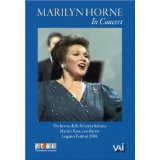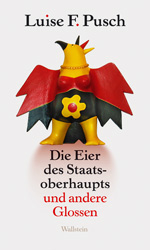
born on January 16, 1934, in Bradford, Pennsylvania, United States
American opera and concert singer
Biography
“Sometimes my life isn't grand opera, it's soap opera,” was Marilyn Horne’s dry description of her efforts when for a time she was having to juggle a career, divorce, motherhood, and a new relationship. She managed well – because in addition to a sense of humor, she possessed a seemingly inexhaustible vitality, strong self-esteem, the ability to concentrate and, of course, a magnificent voice. Her father, a talented tenor who sang semi-professionally in his spare time, encouraged her from a young age and also paid particular attention to her voice development. After graduating from Polytechnic High School, she received a scholarship to the University of Southern California, where she studied voice. She considered herself a soprano until she was asked to sing a scene from Rossini's La Cenerentola at an audition and discovered her true voice as a mezzo-soprano.
She continued to train her voice in several master classes, including with Lotte Lehmann, whose strict coolness she found difficult to cope with. After her debut as Agnes in The Bartered Bride, she was offered the chance to dub the singing voice of Dorothy Dandridge in the film Carmen Jones. For a long time, it bothered her that she sold the recording rights to the songs in the film for only $250. While studying at the university, she met her future husband, the black conductor Henry Lewis. However, due to his military service and her career development, they went their separate ways for many years. Horne had decided to spend several years in Europe, even though her father disapproved and she had until then always relied on his advice and support. Her decision to leave for Europe was a psychological break with him and, because he died of leukemia shortly before her departure, a mournful physical separation as well. In her autobiography she notes: “Mom gave me strength. I think I inherited my backbone from her and my courage from Dad.”
Yet throughout her life she could also rely on the support of influential friends. For example, she had a long-standing friendship with Igor Stravinsky, who dedicated his last work to her. After her father's death, she turned to food for comfort and gained a lot of weight. Her agent, who thought she was too fat to be hired, was worried that the extra pounds would cost her a job with the Gelsenkirchen Opera. “Wait and listen,” was her bold response to his tactlessness: she auditioned and was immediately hired. Horne described her time in Gelsenkirchen as her ‘galley years.’ Although the sooty air took a toll on her voice, the years in the Ruhr region were the springboard for her great career. She sang Mimi in La Bohème, Tatiana in Eugene Onegin, and the extremely difficult role of Marie in Wozzeck, which was also her debut role in San Francisco after her return to the United States. She married Henry Lewis shortly before leaving Europe, even though her family and friends had strongly advised against the interracial marriage: “If you marry Henry, you're finished in America…”
Despite all the prophecies of doom, both their careers developed positively, and Horne describes the birth of their daughter Angela as the most important moment in her life. However, being a mother and a professional singer made life difficult – for her and for her daughter. Feelings of guilt remained, but Horne's self-esteem enabled her to conclude: “One thing is certain: I did my best.” She gained experience on all the major stages in America, as well as at Covent Garden and La Scala in Milan. But her goal was, of course, the Met. Yet feeling she couldn't be expected to immediately jump just because it was the Met asking, she declined offers from Met director Bing again and again. Waiting patiently for the “right” opera, production, and cast for her debut, she accepted only when offered the role of Adalgisa alongside Joan Sutherland in Norma. Since 1961, the two had celebrated numerous triumphs together and formed “the most important female vocal duo of the 20th century.” Conductor Richard Bonynge, Sutherland's husband, had recognized Horne's magnificent talent for bel canto opera and greatly encouraged her consistent development into the rare vocal character of a coloratura mezzo-soprano. Horne enjoyed a close friendship with him and his wife. Anyone who ever saw and heard the tall, hefty Sutherland and the petite, full-figured Horne side by side on stage will never forget the exhilarating and fascinating experience and will regret that Horne took her leave of the stage in a final appearance at Carnegie Hall in 2000 at the age of 66.
(Text from 2009; translated with DeepL.com; edited by Ramona Fararo, 2025. Please consult the German version for additional information, pictures, sources, videos, and bibliography.)
Author: Mechthild Winkler-Jordan
If you hold the rights to one or more of the images on this page and object to its/their appearance here, please contact Fembio.



